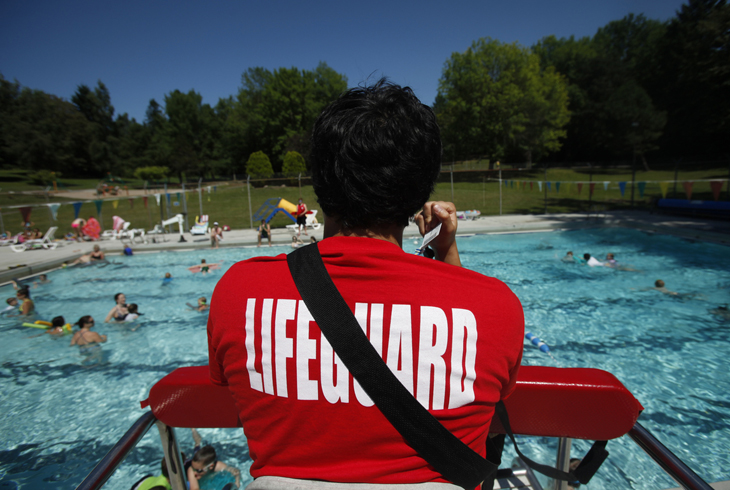Lifeguard classes are essential for those trying to guarantee water safety. These courses give thorough training. They cover different skills and knowledge essential for the role. Participants learn to prevent, perceive, and answer emergencies. We should dig into what lifeguard classes are made out of.
Basic Requirements
Age and Physical Fitness
Most lifeguard courses have a minimum age requirement. Regularly, participants should be somewhere around 15 years old. Physical fitness is additionally crucial. Learners should be in good health. They should have the endurance to perform rescues and persevere through long hours of vigilance.
Swimming Skills
Strong swimming skills are an unquestionable requirement. Courses frequently start with a swimming test. This could incorporate swimming a specific distance inside a time limit. It guarantees that all participants can deal with water-related errands effectively.
Center Parts of Lifeguard Classes
Water Rescue Techniques
Learning water rescue techniques is an essential focus. Learners work on safeguarding distressed swimmers. They learn how to approach, convey, and safely carry them to shore. Different rescue scenarios are reenacted. This incorporates managing overreacted swimmers, oblivious casualties, and numerous setbacks.
CPR and First Aid
Cardiopulmonary Resuscitation (CPR) is a basic skill. Lifeguard classes show how to perform CPR on grown-ups, kids, and babies. First aid training is likewise included. This covers treating cuts, hyper-extends, and other normal injuries. Knowledge of utilizing Automated External Defibrillators (AED) is likewise granted.
Surveillance and Prevention
Prevention is superior to fix. Lifeguards should be watchful. Classes stress the significance of surveillance. Students learn how to successfully screen pools and beaches. They are taught to detect potential hazards and prevent accidents before they occur.
Emergency Action Plans
Each facility has an emergency action plan. Lifeguard classes cover these plans broadly. Students learn how to answer different sorts of emergencies. They work on organizing with different lifeguards and emergency services. Effective execution of these plans can save lives.
Specialized Training
Deep Water and Pool Rescues
Different environments require different techniques. Deep water rescues are seriously difficult. Lifeguard classes show specific methods for dealing with these circumstances. Pool rescues, then again, have their own arrangement of conventions. The two kinds of training guarantee lifeguards are flexible and ready.
Spinal Injury Management
Spinal injuries are serious. Lifeguards need to deal with such circumstances with care. Classes help methods to balance out and ship casualties. Legitimate dealing with can prevent further injury. Students work on utilizing backboards and neck supports.
Utilization of Rescue Equipment
Different apparatuses assist in rescues. Lifeguard classes acquaint students with equipment like rescue tubes, backboards, and buoyancy gadgets. Active practice with these instruments is essential. Students learn how to utilize them really in different rescue scenarios.
Real-Life Simulations
Mock Drills
Practical experience is imperative. Lifeguard classes frequently incorporate mock drills. There students apply their skills. They practice in real-time, going with split-subsequent options. This builds confidence and skill.
Role-Playing Scenarios
Role-playing is another viable method. Learners carry on different roles in emergency circumstances. Some play casualties while others perform rescues. This aides in understanding different points of view and refining techniques.
Theoretical Knowledge
Lifeguard Ethics
Ethics play a significant role in lifeguarding. Classes cover the responsibilities and direct expected of lifeguards. This incorporates understanding the significance of professionalism and secrecy.
Lawful Aspects
Lawful knowledge is crucial. Lifeguards should know about the lawful ramifications of their actions. Classes remember data for assent, carelessness, and responsibility. Understanding these aspects guarantees lifeguards act inside legitimate limits.
Environmental Awareness
It is important to Know the environment. Lifeguard classes show different water environments. This incorporates pools, lakes, and oceans. Students learn about currents, tides, and weather patterns. Awareness of these variables helps in going with informed choices.
Certification and Assessment
Written Exams
Written exams test theoretical knowledge. Students should pass these to continue. The exams cover every one of the points taught in the class. This guarantees they grasp the standards and conventions.
Practical Tests
Practical tests are similarly important. Learners exhibit their skills in controlled environments. They perform rescues, CPR, and first aid. Instructors evaluate their capability and availability.
Continuous Learning and Recertification
Ongoing Training
Lifeguarding skills need consistent refinement. Numerous lifeguard classes offer ongoing training meetings. These assistance in keeping skills sharp and updated. Lifeguards can rehearse new techniques and revive their knowledge.
Recertification
Lifeguard certification isn’t long-lasting. Intermittent recertification is required. This guarantees lifeguards stay capable and mindful of the latest conventions. Courses for recertification are accessible and frequently less broad than the underlying training.
Finding Lifeguard certification Near Me
Local Facilities
Numerous local facilities offer lifeguard classes. These incorporate community places, universities, and confidential organizations. Searching for “lifeguard certification near me” can assist with finding appropriate options.
Online Assets
A few organizations give data on the web. Sites list accessible classes and schedules. They likewise give insights regarding the educational plan and requirements. This makes it more straightforward to pick the right course.
The American Lifeguard Association
The American Lifeguard Association is a respectable supplier. They offer complete lifeguard certification programs. Their courses are perceived broadly. They stress practical skills and theoretical knowledge. Choosing a course from the American Lifeguard Association guarantees quality training.
Summary
Lifeguard classes are essential for water safety. They cover a large number of skills and knowledge. From basic swimming to advanced rescue techniques, these classes plan people for the challenges of lifeguarding. Continuous learning and recertification keep skills sharp.
Whether searching for “lifeguard training” or “lifeguard certification near me,” numerous options are accessible. Organizations like the American Lifeguard Association give first rate training, ensuring lifeguards are prepared to save lives and keep up with safety in water environments.





